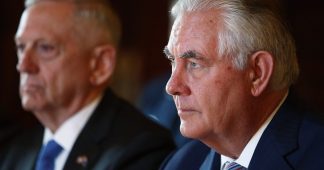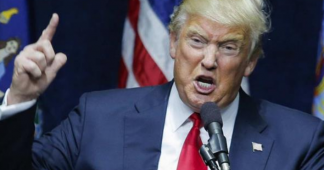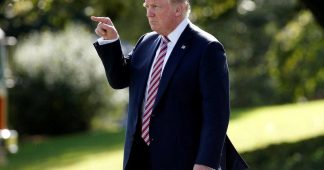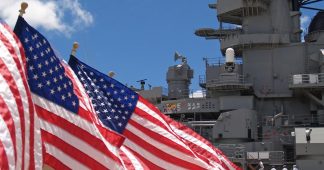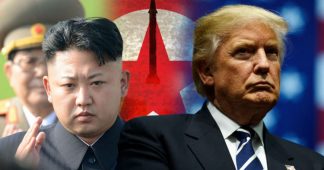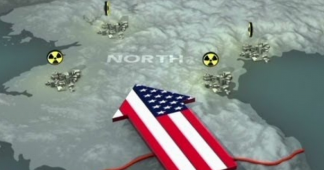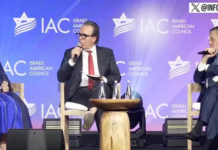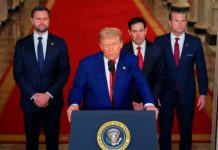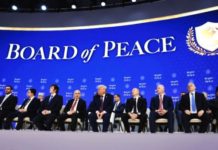Trump administration scotches suggestion of talks with North Korea
By Peter Symonds
The White House has quickly undercut suggestions by US Secretary of State Rex Tillerson on Tuesday that Washington was willing to start talks with North Korea without preconditions. The latest differences emerge amid growing signs that the Trump administration is preparing to wage war against the Pyongyang regime in the coming months unless it capitulates completely to US demands.
Tillerson’s remarks to the Atlantic Council appear to be a last ditch attempt to start talks to try to prevent a conflict that could spiral out of control. “It is not realistic to say we’re only going to talk if you come to the table ready to give up your [nuclear] program,” he said, contradicting the more aggressive stance taken by Trump.
With a note of desperation, Tillerson continued: “We’re ready to have the first meeting without preconditions. Let’s just meet. We can talk about weather if you want. We can talk about whether there is gonna be a square table or a round table if that’s what you’re excited about. But can we at least sit down and see each other face to face.”
North Korea, however, is well aware that the US demands remain—to scrap its limited nuclear arsenal and abandon all related nuclear and missile programs. Moreover, such a step would involve an ever-more intrusive inspection prying into all aspects of its military and security apparatus.
Tillerson’s assurances that the US is not looking for a pretext to attack North Korea and not seeking regime-change in Pyongyang are belied by Trump’s threats to “totally destroy” the country. North Korea has hinted that it would be willing to take part in negotiations, but as they have not been forthcoming, appears to have concluded that its nuclear arsenal is its only means of defence. Pyongyang has pointed to the fate of Iraq and Libya—which bowed to US demands over their weapons of mass destruction—only to be attacked.
White House press secretary Sarah Huckabee Sanders scotched any suggestion that Trump’s views on North Korea had changed. While Tillerson claimed he had Trump’s support for his initiative, the president issued a public rebuke to the secretary of state in October, tweeting that he was “wasting his time” trying to negotiate with “Rocket Man”—Trump’s derogatory term for North Korean leader Kim Jong-un.
An unnamed White House official more explicitly repudiated Tillerson’s comments, declaring that “clearly right now is not the time” for talks, given North Korea’s most recent missile test. “The administration is united in insisting that any negotiations with North Korea must wait until the regime fundamentally improves its behaviour.”
Tillerson’s comments are another warning that the US war drive against North Korea is accelerating. “Our military preparedness is strong… the president has ordered our military planners to have a full range of contingencies, and they are ready,” he told the Atlantic Council.
“As I’ve told people many times, I will continue our diplomatic efforts until the first bomb drops,” Tillerson said. “I’m confident that we’re gonna be successful. But I’m also confident that [US Defence] Secretary Mattis will be successful if it ends up being his turn.”
The US and South Korea have held, one after another, the largest-ever joint military exercises this year that are, in reality, rehearsals for war with North Korea. Last week, some 12,000 military personnel and more than 200 warplanes, including B-1B strategic bombers and the latest F-35 stealth fighters took part in major air drills. This week the US, South Korea and Japan were engaged in testing anti-missile systems.
While declaring that Washington’s aim was not regime-change, Tillerson again put pressure on China, saying: “The president would like to see China cut off the oil [to North Korea]. The last time the North Koreans came to the table was because China cut off the oil.”
Under strong-arming from Washington, China has already agreed to harsh UN sanctions that block most North Korean exports and limit energy imports. The top UN human rights official Zeid Ra’ad al Hussein told a UN Security Council on Tuesday that the punitive measures had already compounded the humanitarian crisis in North Korea.
An estimated 18 million North Koreans, or 70 percent of the population, suffer from acute food shortages and aid agencies provide “literally a lifeline” for 13 million of them, al Hussein said. Food prices have shot up 160 percent since April. The sanctions are also impeding the efforts of aid organisations to provide adequate relief.
The Trump administration’s policy of “maximum pressure and engagement” is clearly aimed at forcing the North Korean regime to its knees or provoking an economic and political crisis that causes it to implode. China, which has desperately sought to prevent an implosion in Pyongyang, is now preparing for the worst. The New York Times reported that a Chinese county bordering North Korea has begun establishing camps for refugees that could flood into China.
More ominously, a provincial newspaper in the border area—the state-owned Jilin Daily —issued a full-page advisory last week entitled “General Knowledge about Nuclear Weapons and Protection.” Concerned at the prospect of a nuclear war on its doorstop, the provincial air defence office explained the article was part of “national defence education.”
Speaking to the Atlantic Council, Tillerson indicated that the US already has plans to intervene militarily in North Korea in the event that its government collapses—on the pretext of securing the country’s nuclear weapons. He said that the US had offered assurances to China that any American troops that crossed the border into North Korea would be withdrawn.
Such guarantees are unlikely to convince Beijing, which is deeply concerned at the possibility of the US installing a puppet regime in Pyongyang.
A top UN official—political chief Jeffrey Feltman—made a rare visit to North Korea last week amid the rising danger of war in a bid to defuse tensions and initiate talks, but to no avail. After a close briefing on his return, Sweden’s deputy UN ambassador Carl Skau pessimistically declared: “Nothing was said that left us less worried than we were before.”
As for Tillerson’s offer of talks without preconditions, it will only continue to fuel widespread speculation that Trump will replace him with a hard-line warmonger.
